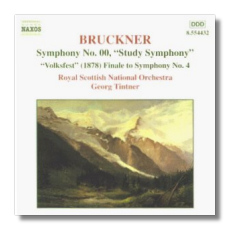
The Internet's Premier Classical Music Source
Related Links
- Bruckner Reviews
- Latest Reviews
- More Reviews
-
By Composer
-
Collections
DVD & Blu-ray
Books
Concert Reviews
Articles/Interviews
Software
Audio
Search Amazon
Recommended Links
Site News
 CD Review
CD Review
Anton Bruckner

Symphony #00
- Symphony "#00" (Study Symphony)
- Symphony #4: 4th movement (second version – "Volksfest" 1878)
Royal Scottish National Orchestra/Georg Tintner
Naxos 8.554432 DDD 56:37
"One who deals with eternal things is in no hurry," writes conductor Georg Tintner in the booklet notes to this release. He was referring primarily to Bruckner and his unusual creative timeline when he wrote these words, and secondarily to performers and listeners who must be patient if they wish to unlock his massive, philosophically rich symphonies. Ironically, Tintner died several months ago in a self-designed "final exit" driven by terminal cancer. He had completed – barely – his integral cycle of Bruckner symphony recordings for Naxos not long before. This recording is one of the last fruits of that cycle.
Bruckner wrote this study symphony in his fortieth year. His life was more than half over, and yet all of his masterpieces were yet to be written. This symphony was an assignment for Otto Kitzler, his last competition teacher, whose verdict was "not very inspired." Overall, Kitzler's comment may not be inaccurate, but sometimes not very inspired can be inspired enough; this symphony has many delightful and rewarding features. It would have been easy enough for Bruckner to destroy it, as he did with other bits of "juvenilia," but he did not, suggesting that he believed it to be not completely lacking in merit, even though he disowned it.
The symphony, in Tintner's words, is "full of Schumann and Mendelssohn," although there are enough Brucknerian fingerprints upon it to make its patrimony unquestionable. Most characteristic is the Scherzo, which is delightful. There's nothing to be ashamed of here, even if it doesn't scale the heights that Bruckner would reach later. Taken as a whole, the symphony is well constructed and pervaded by a friendly, masculine charm. It seems to me that it has something to offer not just to Brucknerians, but to devotees of Austro-Hungarian romanticism in general.
It is the third (1880) version of the Symphony #4 ("Romantic") that is most familiar today. Bruckner's earlier thoughts on the finale are really fascinating; the beloved themes appear in new costumes, thereby deepening our relationship with them. This "Volksfest" finale is smaller-scaled than the one we know best. Although it is less impressive, it is not a failure in any sense of the word, and it gives us insight into how the composer thought and worked.
Tintner, like Günter Wand, knew Bruckner as well as he knew his own life. Hearing Tintner's Bruckner recordings is like appreciating the work of a veteran auto mechanic: he might not have designed any racecars or worked at the Indy 500, but he knows how cars are put together and what makes them work. In short, Tintner is like the only mechanic you'd trust with your difficult, but adored, Fiat. This recording is a fitting memorial. The Royal Scottish National Orchestra plays as if they were having a mass out-of-body experience, and the recording is superb. If you have not given Tintner's Bruckner recordings a try, here's your chance.
Copyright © 2000, Raymond Tuttle


















